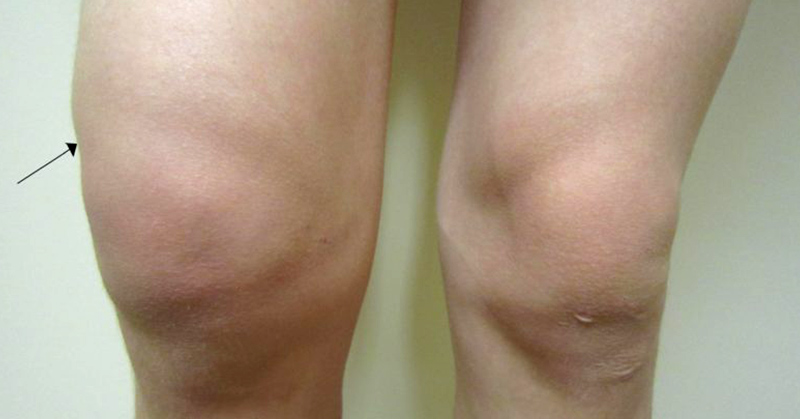Fibromyalgia is still a widely misunderstood condition, one that the medical community is still exploring and learning about. Fibromyalgia presents itself in several forms, which contributes to its notorious mystique. One less well-known condition caused by fibromyalgia is edema (or fibromyalgia swelling). Is edema plaguing you?
Fibromyalgia Complications: What is Edema?

Edema is swelling caused by excess fluid trapped in your body’s tissues. Edema can affect any part of the body, though is most commonly noticed in the hands, arms, feet, ankles and legs (1). Edema, like other pain conditions, can cause a high level of frustration and baffle those afflicted. Identifying the symptoms properly can provide answers and indicate if you are an edema sufferer. Fortunately, there are natural remedies that can aid in controlling or reducing the symptoms of edema. If you are presenting with the following symptoms you may be suffering from edema.
Recognizing Edema Symptoms

Edema symptoms include swelling or puffiness which is most common in the legs or arms. Stretched or shiny skin which may be prone to ripping or tearing. Dimpled skin; this is evident in skin that retains an impression after being pressed for several seconds. Additional edema symptoms include increased abdominal size, shortness of breath and heavy arms or legs.
Common Triggers of Edema

If you experience edema as a complication of fibromyalgia, it’s useful to know about other common causes. Doing your best to avoid these triggers can help prevent your edema from getting worse as you use natural remedies to manage it.
- Sitting or standing for extended periods (1).
- Certain medications: high blood pressure medication, steroids, estrogens, nonsteroidal anti-inflammatory drugs and certain diabetes medications called thiazolidinediones (1).
- Kidney Disease may contribute to extra sodium and fluid in your circulation. Usually occurs in legs and around your eyes (2).
- Cirrhosis Fluid may accumulate in your abdomen and your legs from liver damage (1).
- Heart Failure If the heart is weak and unable to pump blood efficiently, blood will pool in certain areas of the body. This can cause fluid to leak from the blood vessels into the surrounding area (2).
- Venous Insufficiency: A deficiency of blood flow. When your veins have trouble sending blood from your limbs back to the heart. Often caused by varicose veins (3).
- Severe Protein Deficiency: Protein helps to hold salt and water inside the blood vessels. When albumin, a blood protein becomes too low, excessive fluid is retained and can leak out into the tissues (1).
6 Natural Edema Remedies

Fortunately, there are several natural remedies that can help reduce swelling and promote circulation without relying solely on medication. These simple yet effective solutions can be easily incorporated into your daily routine to help alleviate discomfort and improve overall well-being.
1- Apple Cider Vinegar

Helps replenish potassium levels and reverse fluid retention (4). Add 1 or 2 tsp to a glass of water and drink. Apple cider vinegar is also a nice addition to salad.
2- Epsom Salts

Reduces swelling and inflammation, can also extract excess fluids and toxins from the body (4). In your bath pour 2 cups of Epsom salts. Soak in it for 10-15 minutes. This can be repeated up to 3 times a week. Alternatively, skip the whole body bath and soak only the feet. In a small tub or bucket submerge your feet in warm water reaching just above the ankles. Add 1/2 cup of Epsom salts and soak for 30-60 minutes.
3- Tea Tree Oil

Rubbing tea tree oil on the affected area helps reduce swelling and inflammation (4). Add 5-10 drops of tea tree oil to a carrier oil and gently rub on the affected area. A carrier oil is necessary as to limit irritation on the skin. Carrier oil suggestions include coconut oil, almond oil, avocado oil or olive oil.
4- Dandelion Leaf

A natural diuretic that encourages the draining of fluid. Dandelion also contains potassium which will balance sodium levels in the body (4). Try adding some dandelion to your tea.
5- Parsley

A natural diuretic that stimulates the production of urine to help relieve water retention and bloating (5). Add 1 teaspoon of dried parsley to 2 cups of water. Boil it for 10 minutes, strain and then drink. Parsley is also a nice addition to soups, salads or sandwiches.
6- Massage

A gentle massage will promote blood flow, relieving pressure on blood vessels and help reduce swelling. Apply warm oil to the affected area and use gentle rubbing strokes to promote healing. Suggested oils include mustard, olive or coconut.

